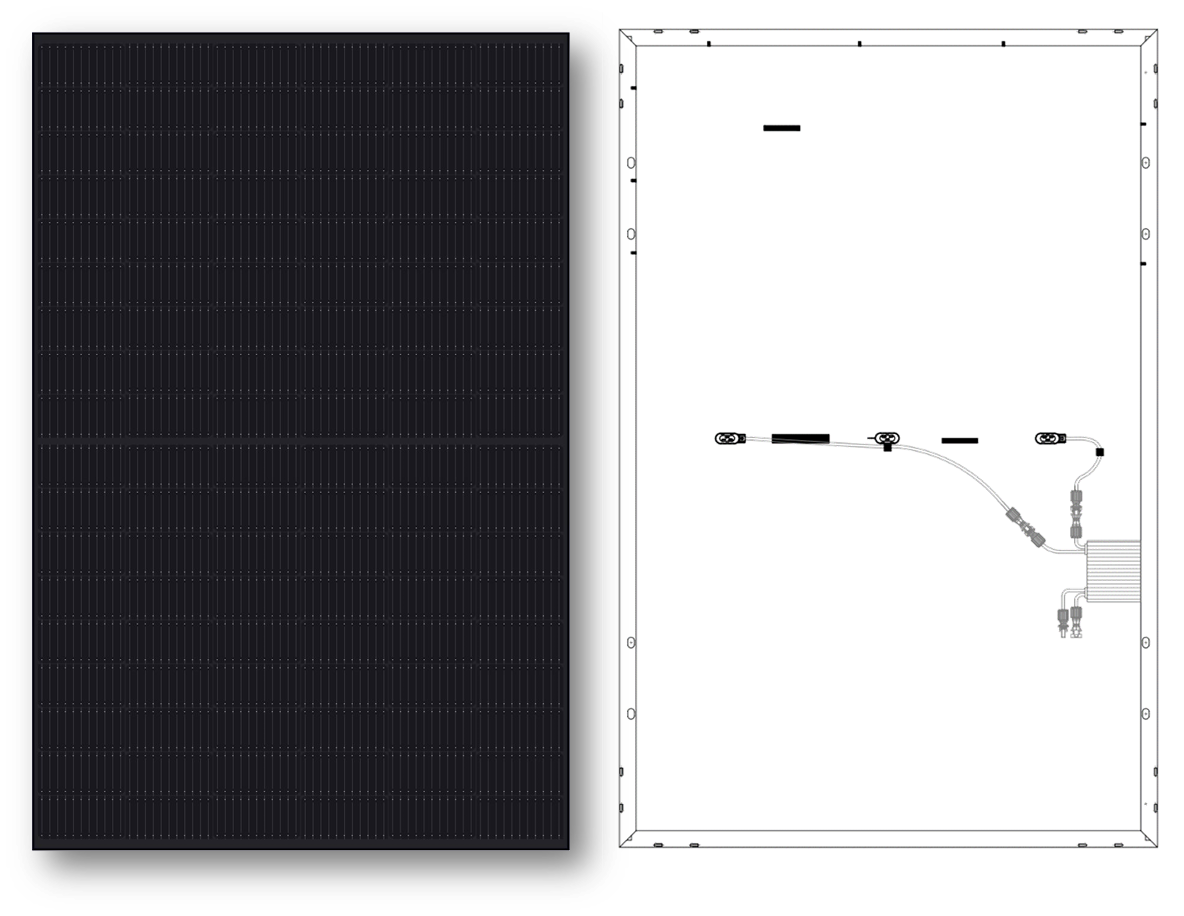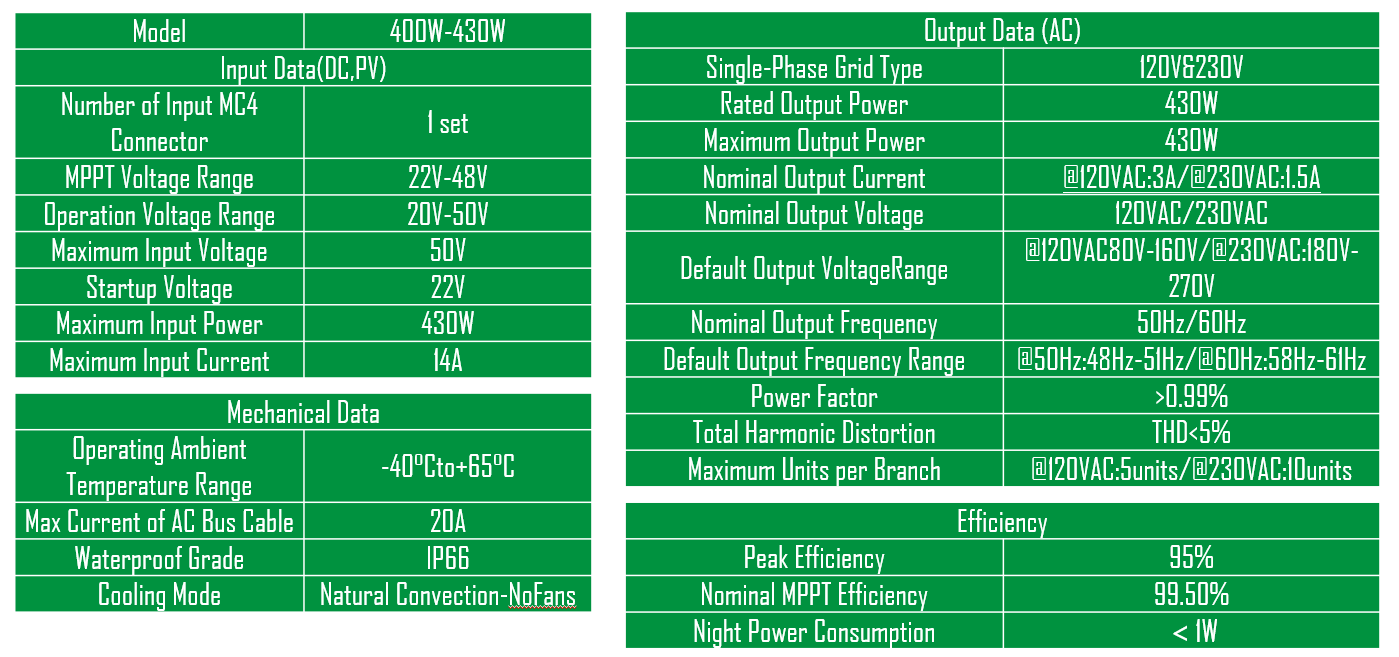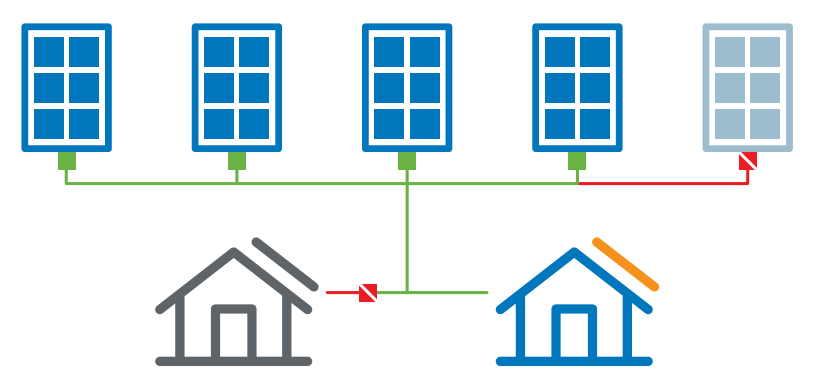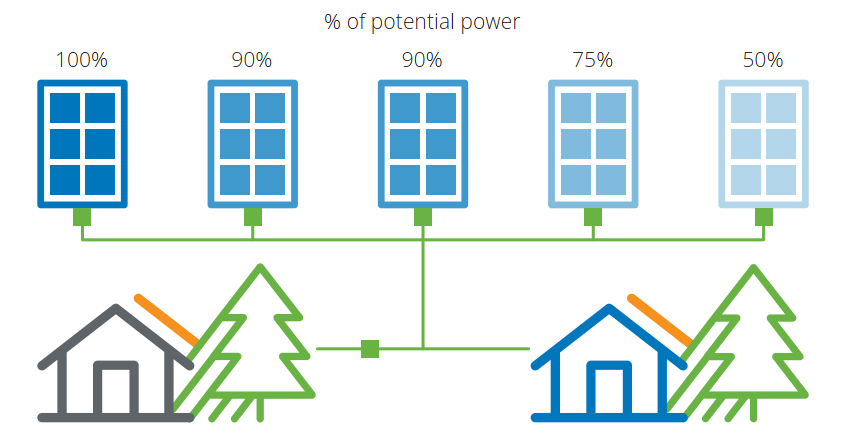There are two biggest advantages of AC Solar Module: one is the collective advantage, and the other is the safety advantage. Next, I will tell you in detail.
The collective advantage: Integrated AC module Design for Green Life With Renewable Energy Production
Functions of AC solar panel = 1 solar panel +1 micro-inverter > 2 = normal solar panels with DC power + normal string inverters (or other normal inverter system including central inverter), which shall be called a traditional system
Solar ac module price = 1 solar panel +1 micro-inverter <2 = normal solar panels with DC power+ normal string inverters (or other normal inverter system including central inverter), which shall be the traditional system
Our AC Solar Module combines the advantages of solar panels and micro-inverters, generating electricity from solar sunshine and converting direct current to alternating current in one product, which will be integrated together in the factory and shipped together to our customers; Our talented designers and hard-working engineers considered the final needs of end users, who need the power directly from the first moment when they put the AC solar module under sunshine, not waiting for installation by third parties with normal solar panel and inverter;
Our solar ac control module covers huge ranges of power bins according to the mainstreams of the solar industry, including all the power bins for residential needs to Utility requirements, each solar panel we use in AC solar modules will perfectly match the micro-inverter we choose, and each micro-inverter we used in AC solar module was also adjusted to the highest efficiency basing on the solar panel system we selected, wherever your AC solar panels will be installed in the high latitude countries or near the equator, wherever our AC solar panels will be installed facing to the south in the northern hemisphere/north in the southern hemisphere or facing to the west and east when customer’s roof is polyhedral, AC modules perform better than any normal solar panel randomly combined with a string inverter;
As a professional manufacturer, we always focus on the cost of solar systems, so from the beginning of AC module system design, we created unique manufacturer’s equations for PV modules and our own inverter to reach the lowest cost with high-level quality, resulting in our Smart module is cheaper than the scenario of purchasing solar panels and micro-inverters separately, even be competitive with the solar panels and string inverter systems, that is why we call it functionally 1 + 1 > 2 and price 1 + 1 <2;
AC modules are your best choice when you wish to build your roof solar array or do the solar installations by yourselves, not only cost effective, also enjoy the solar installation experience when you install solar panels under the beautiful blue sky, which will be bluer becasue your effort to save the earth by solar panel system for your own green life, our AC panels are the best solar panels you could image in the market and AC panels will be recommended by your eletrican friends if you talk with them about the solar panels or pv modules, it support the local electricity network well and will be perfectly suitable for your roof, the micro-inverter we provided has advanced internet connection, 100% meets your easy installation plan and will give you the solar systems data minutes by minutes day by day month by month, all the solar system and solar panels data could be shown through every one inverter to your phone if you could only spend 3 minutes to follow our solar panels installation instructions, home solar by yourself! what a wonderful job!

The safety advantage: the safest solar panels operate individually without direct current high voltage
The world is rapidly moving towards renewable energy solutions, and solar power is at the forefront of this movement. Among the various types of solar modules available in the market, the AC solar module stands out as the safest option. This is primarily due to its unique design and operation that eliminates the risk of high voltage.
The AC solar module, also known as the AC photovoltaic module, is a type of solar module that generates alternating current (AC) directly from sunlight. It integrates a microinverter with the solar panel, converting the direct current (DC) produced by the solar cells into AC right at the source. This is a significant departure from traditional solar modules, which generate DC that must then be converted to AC by a separate inverter.
The absence of high-voltage DC in an AC solar module is its most significant safety feature. High voltage DC, as found in conventional solar systems, can pose a serious risk of electrical shock and can be a fire hazard, especially in the event of equipment failure or improper installation. By converting the DC to AC at each individual panel, the AC module effectively eliminates this risk.
Moreover, the AC solar module’s design simplifies the installation process. Without the need for high-voltage DC wiring, the installation becomes safer and more straightforward, reducing the potential for installation errors that could lead to safety issues.
In conclusion, the AC solar module offers unparalleled safety by eliminating the risk of high voltage DC simplifies installation, and delivers reliable performance. As the world continues to embrace solar power, the AC solar module is poised to become an integral part of the renewable energy landscape. Our integrated system solution seamlessly matches modules and inverters for unparalleled system efficiency. Module-level MPPT technology significantly boosts power generation, ensuring you get the most out of your solar energy system.

In addition to the above two main advantages, there are also 7 secondary advantages to tell you.
1. Innovative AC Module Technology for Exceptional Performance by Solar Panel Level Optimization
2. Leading Inverter Technology for Peak Efficiency for dedicated solar panels
Our innovative contravariant scheme, optimized for low current modules, achieves peak efficiencies above 97.2%. Utilizing the latest semiconductor technology, our inverters deliver higher conversion efficiency, smaller sizes, and reduced self-consumption.
3. Improved overall labor costs, saved installation time
Our lower system currently minimizes arcing hazards, significantly enhancing safety. Remote monitoring and rapid shutdown capabilities through our Intelligent Cloud Platform ensure continuous protection and peace of mind.
4. Improved overall ac solar system BOM costs
With our Solar AC Control Module, you can harness the sun’s power with greater efficiency, safety, and ease of installation. Experience the transformative impact of solar energy and reap the rewards of a sustainable future.
5. Solar panel level monitoring
6. Easy to do the solar panel maintenance
7. The longest solar panels warranty in the solar panels market
Summary: Smart AC module is the ultimate solution for PV module systems derived from first principles.

FAQ
What is AC module/ AC solar panels?
An AC module, also known as an AC solar panel or an AC module system, is a type of solar panel that integrates an inverter directly into the panel itself. Traditional solar panel systems consist of solar panels that generate direct current (DC) electricity, which is then converted into alternating current (AC) electricity by an external inverter. However, AC solar modules simplify the installation process by eliminating the need for a separate string inverter system.
Why AC solar panels will be the trend?
AC solar panels are expected to be a growing trend in the solar industry for several reasons:
Simplified Installation: AC solar panels streamline the installation process by integrating the inverter into the solar panel, reducing the complexity and cost of the installation.
Improved Performance: AC solar panels can optimize the performance of each panel individually, as the integrated inverters allow for panel-level maximum power point tracking (MPPT). This means that shading or issues with one panel won’t affect the performance of the entire system.
Enhanced Safety: AC solar panels have built-in safety features, such as rapid shutdown capabilities, which can automatically shut off the electricity flow in case of emergencies or maintenance.
Flexibility: AC solar panels can be easily expanded or modified by adding more panels as needed, making them a flexible option for future system upgrades.
Standardization: AC solar panels adhere to industry standards, making it easier for manufacturers, installers, and consumers to work with and integrate different components. This standardization helps streamline the supply chain, reduce costs, and increase overall system compatibility.
Market Demand: As solar energy continues to gain popularity and adoption, there is a growing demand for simplified and efficient solar solutions. AC modules address this demand by providing an all-in-one solution that simplifies the installation process and improves system performance.

How do AC solar panels work?
AC solar panels work by integrating an inverter directly into the solar panel itself. Here’s a step-by-step explanation of how AC modules work:
Solar Generation: AC panels consist of solar cells that convert sunlight into direct current (DC) energy from the roof, similar to traditional solar panels. The solar cells within the AC module generate DC electricity when exposed to sunlight.
Integrated Inverter: Unlike traditional solar panels, AC modules have an inverter integrated into the panel. The inverter’s role is to convert the DC electricity generated by the solar cells into alternating current (AC) electricity, which is the type of electricity used in most homes and businesses. The integrated inverter is typically a microinverter or a power optimizer.
AC Output: Once the DC electricity is converted into AC electricity by the integrated inverter, it is available as AC output directly from the AC module. The AC electricity can be used to power electrical loads in your home or business, or it can be fed into the electrical grid.
Plug-and-Play Installation: AC modules are designed for easy installation. They often come with a plug or connector that can be directly connected to a standard electrical outlet or a dedicated circuit. This eliminates the need for complex wiring and separate mounting of the inverter, simplifying the installer process, plug-in, and done.
Grid Connection: The AC electricity generated by the AC module can be connected directly to the electrical grid. It can be used to power your electrical loads, reducing your reliance on grid electricity. If the AC module generates excess electricity, it can be fed back into the grid, often through a net metering arrangement, where you receive credits for the electricity you contribute.
Monitoring and Control: AC modules often come with built-in monitoring and control capabilities. These features allow you to monitor the energy generated by each AC module individually and the overall system. You can track energy production, monitor system health, and identify any issues or inefficiencies.
The typical AC modules
Typical AC modules available in the market include microinverter-based AC modules and DC optimizer-based AC modules. Here’s a brief explanation of each type:
Microinverter-based AC Modules: Microinverter-based AC modules have a microinverter integrated into each individual solar panel. The microinverter converts the DC electricity generated by the solar panel into AC electricity. This means that each panel operates independently, optimizing the performance of each panel regardless of shading or other issues affecting individual panels. Microinverter-based AC modules offer panel-level monitoring and control, allowing you to monitor the performance of each panel separately.
DC Optimizer-based AC Modules: DC optimizer-based AC modules use DC optimizers, also known as power optimizers, which are connected to each solar panel. The DC optimizer optimizes the DC electricity generated by the solar panel before it is converted into AC electricity by a central inverter. The central inverter then converts the DC electricity from multiple panels into AC electricity. DC optimizer-based AC modules offer some of the benefits of microinverter-based AC modules, such as panel-level MPPT and improved system performance in shaded conditions. However, the optimization occurs at the DC level rather than at the panel level.
Both microinverter-based AC modules and DC optimizer-based AC modules offer simplified installation, improved system performance, and monitoring capabilities. They eliminate the need for a separate string inverter, simplify the wiring, and allow for individual panel performance monitoring. These features make AC modules an attractive option for residential and commercial solar installations.
It’s important to note that different manufacturers may have variations in the design and functionality of their AC modules. Therefore, it’s recommended to consult with a professional solar installer or research specific product specifications to understand the features and benefits of a particular AC module before making a purchase decision.

Where to buy AC module?
There are several options available for purchasing balcony solar systems. Here are a few places where you can buy them:
Solar Installers: Contact local solar installation companies or contractors in your area. They can provide you with information on balcony solar systems, assess your specific requirements, and offer installation services.
Online Retailers: Many online retailers specialize in selling solar panels and related equipment. Websites such as Amazon, eBay, and specialized solar equipment retailers offer a wide range of solar products, including balcony solar systems. Make sure to research the seller’s reputation and read customer reviews before making a purchase.
Solar Equipment Suppliers: Some suppliers specialize in selling solar equipment and components. They may have physical stores or online platforms where you can browse and purchase balcony solar systems. Examples of such suppliers include Wholesale Solar, Solar Electric Supply, and altE Store.
Manufacturer Websites: Visit the websites of solar panel manufacturers to explore their product offerings. Many manufacturers have a network of authorized dealers or distributors from whom you can purchase their products. Some well-known solar panel manufacturers include SunPower, LG Solar, and Canadian Solar.
When buying a balcony solar system, it’s important to consider factors such as the quality and efficiency of the panels, warranty coverage, and compatibility with your specific requirements. Additionally, compare prices, read customer reviews, and consider consulting with a solar professional to ensure you make an informed decision.
It’s worth noting that the availability of balcony solar systems may vary depending on your location and the specific market conditions. Therefore, it’s recommended to explore multiple sources and consult with local experts to find the best option for purchasing a balcony solar system in your area.